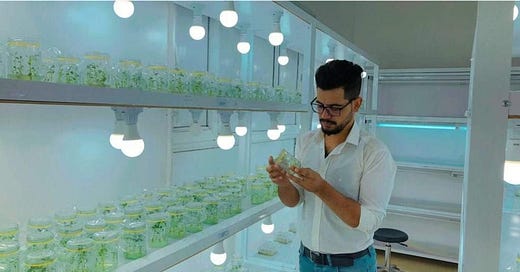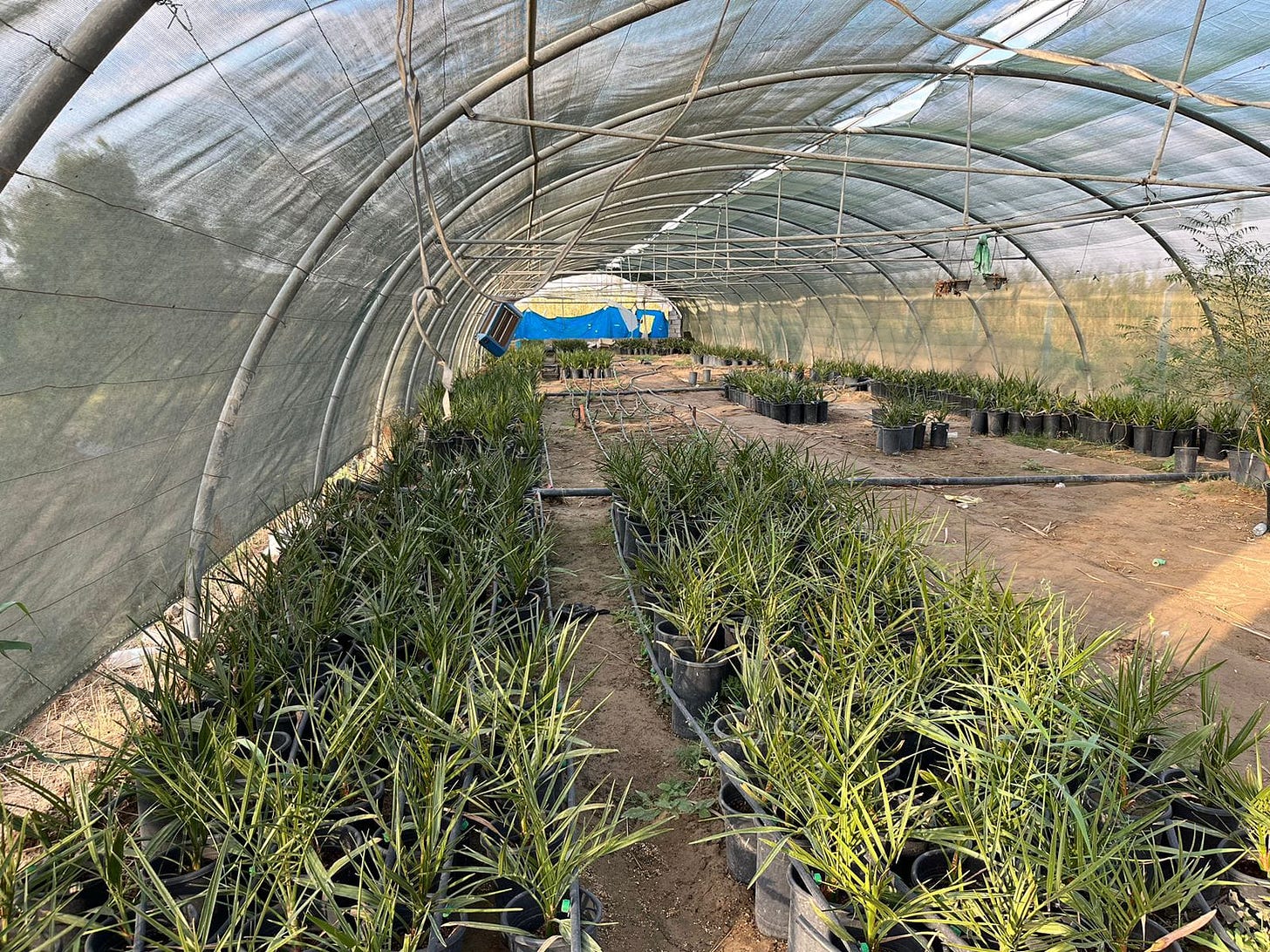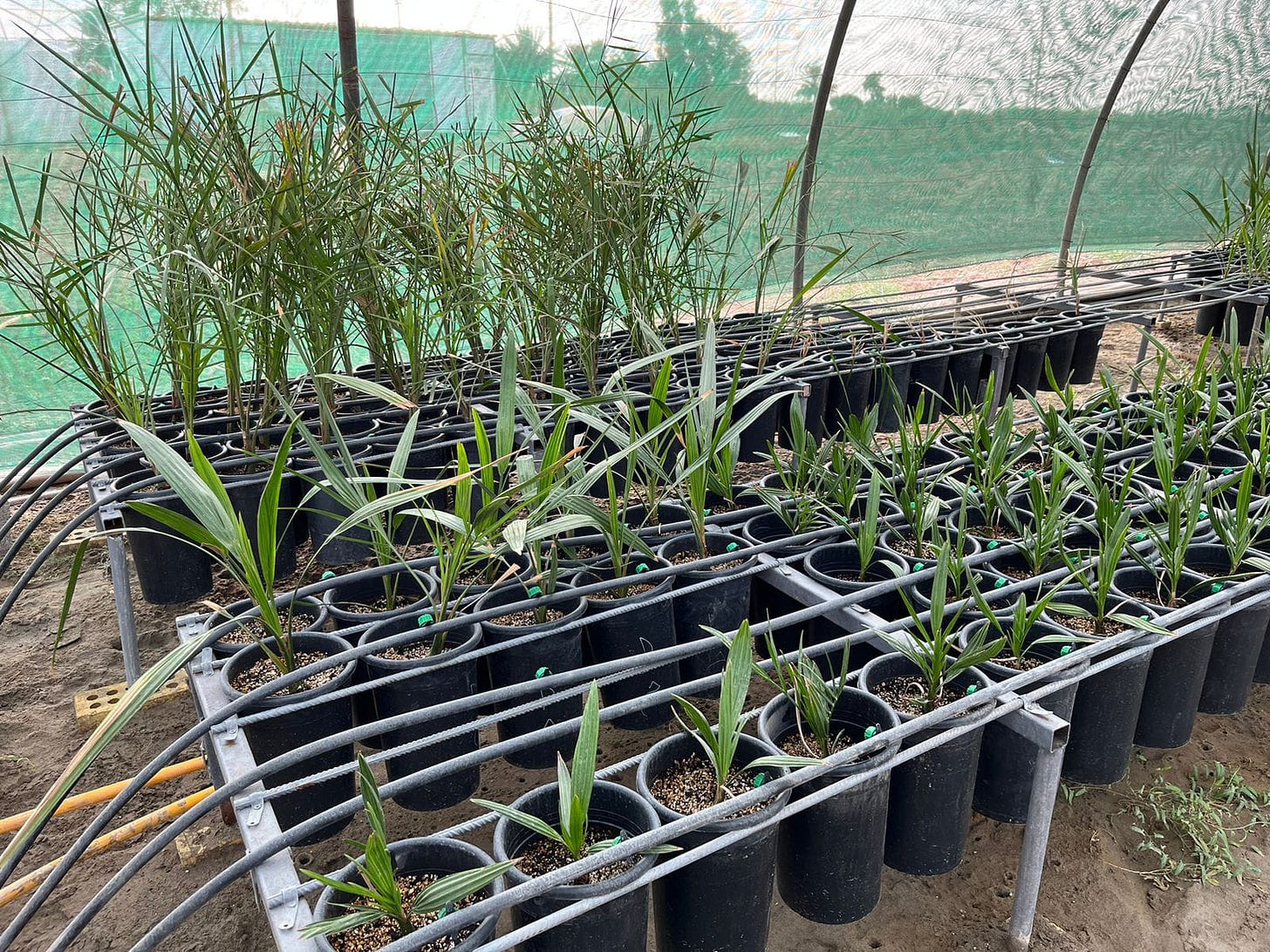Reviving Iraq's Agricultural Legacy
Date palms defined the landscape in Iraq before war destroyed half the country’s trees. Agritech startup Shamarekh is pioneering a new way to optimize growing
Waleed Alfatlawy didn’t expect to turn a profit so quickly when he launched his agritech startup, Shamarekh, in 2023. He spent several years developing his ideas before importing vegetable seedlings from different countries. His short-term plan was to grow them to a larger size and then sell them at a higher price. A year later, his company expanded to take on more staff and grow new plant varieties, and they celebrated a $15,000 profit after just 16 months in business. But this is just the first step. In the future, he wants to clone plants using tissue culture, multiplying healthy crops to create huge yields. “It’s faster and more efficient than normal plantation, and you don’t have to rely on nature for the results,” explains Alfatlawy, 29.
It’s not the usual story for farmers in Iraq. Agriculture, in what was once known as the fertile crescent, has become an industry of plunging incomes and steep job losses as the sector struggles to adapt amid rising temperatures and environmental decline. Increasing numbers of families are leaving land they have farmed for generations to work in cities, unable to scratch a living from parched soil and wilting crops. According to the UN, Iraq is the fifth most vulnerable country to the impacts of climate change, and farmers are feeling the effects.
As the country becomes hotter and drier, innovators like Alfatlawy are seeking solutions that will enable Iraq’s agriculture sector to diversify and meet the challenges posed by climate change. His method of cloning plants creates exact copies of successful crops rather than leaving it to chance. “The idea is to avoid genetic variations because they are unpredictable,” he explains.
It is a delicate science. Any slight imbalance in nutrition could lead to a variation and undermine the entire yield. Alfatlawy comes from an agricultural family and studied biotechnology at university, but finding other people specialized in this field is difficult in Iraq, particularly in the plant he wants to try next—palm trees. “Only a handful of scientists around the world have worked on cloning date palms in this way; it’s a very sensitive process,” Alfatlawy says. It's also time-consuming. It takes around eight years to produce a palm tree using this technique, but if they get it right, the method could help restore Iraq’s depleted stock of date palms.
Reviving a Legacy
Once, Iraq led the world in date production, but following war with Iran in the 1980s and the US-led invasion in 2003, millions of palms were burnt, and its market share plunged to just five percent. Now, the country imports dates from overseas, undermining efforts to revive the local date business and restore Iraq’s date farming prestige. “The palm tree is rooted in the history of Iraq. Imagine a country whose culture and economy were based around date palms now importing dates because they lost half their trees,” Alfatlawy says.
His ambition is to help return the Iraqi date palm to its former glory, using his knowledge of biotechnology to ensure a seamless integration. “After the trees were burnt, Iraq started importing small trees from other countries, but they weren’t grown in a sterile environment, and some carried diseases that started to spread,” Alfatlawy says. There were wider impacts, too. When a palm is culled, it’s not just the tree that is lost. “Because the sun here is scorching, we use palms to provide shade and plant other crops underneath, so the loss of these trees can be devastating,” he adds.
Palm trees are naturally resilient—they can withstand storms, drought, and extreme heat, which makes them ideally suited to Iraq’s rising temperatures. But with the decline of the date industry, fewer young people are choosing to work in the sector, and farmers are increasingly selling off their palm groves to developers. Around Baghdad, small pockets of trees recall previous eras when the city was surrounded by acres of palm groves before the recent construction boom devoured what was left.
Scientific solution
Despite this bleak picture, Alfatlawy is confident he can make a positive impact. His project has drawn support from both the Iraqi federal government and the Kurdish regional government, which provided him with land and equipment to establish a laboratory. All he needs now is financing to drive the palm tree phase of his project ahead. An Innovation Hub grant from Ideas Beyond Borders is funding a new greenhouse, irrigation system, and generator to optimize growing conditions for cloned plants.
“Waleed Alfatlawy is developing a successful business model that will fund his innovative method of farming in Iraq. This work is addressing some of the most pressing problems the country faces as it confronts climate change and food security concerns in an increasingly difficult environment,” says Faisal Al Mutar, President of Ideas Beyond Borders.
Progress has been swift so far, but Alfatlawy knows that the next phase will take time, particularly when he begins working with palm trees. “I’m a patient person. I’m confident that I know what I’m doing and that soon we will be ready to start producing palm trees ourselves,” he says. Over the next six years, he will gradually close down the import side of the business to focus on the plant tissue culture and plant propagation laboratory.
In the meantime, he is preparing the business for expansion. He is currently in the process of registering the company to open up further funding opportunities. Registration is an expensive and time-consuming process in Iraq, but it is difficult for startups to expand in the local market without formal recognition. “The IBB fund is the first grant I have received. In the future, I will apply for further grants to move to a sustainable model that relies on solar power rather than fossil fuels,” he says.
This article was written by Olivia Cuthbert.






